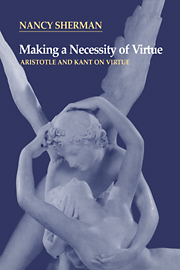Book contents
- Frontmatter
- Contents
- Preface and Acknowledgments
- Abbreviations and Notes on Translations
- Chapter 1 A New Dialogue
- Chapter 2 The Emotional Structure of Aristotelian Virtue
- Chapter 3 A Brief Stoic Interlude
- Chapter 4 The Passional Underpinnings of Kantian Virtue
- Chapter 5 The Shared Voyage
- Chapter 6 Aristotelian Particularism
- Chapter 7 Making Room for Practical Wisdom in Kantian Ethics
- Chapter 8 Perfecting Kantian Virtue: Discretionary Latitude and Superlative Virtue
- Bibliography
- Index
Chapter 4 - The Passional Underpinnings of Kantian Virtue
Published online by Cambridge University Press: 18 December 2009
- Frontmatter
- Contents
- Preface and Acknowledgments
- Abbreviations and Notes on Translations
- Chapter 1 A New Dialogue
- Chapter 2 The Emotional Structure of Aristotelian Virtue
- Chapter 3 A Brief Stoic Interlude
- Chapter 4 The Passional Underpinnings of Kantian Virtue
- Chapter 5 The Shared Voyage
- Chapter 6 Aristotelian Particularism
- Chapter 7 Making Room for Practical Wisdom in Kantian Ethics
- Chapter 8 Perfecting Kantian Virtue: Discretionary Latitude and Superlative Virtue
- Bibliography
- Index
Summary
SOME BACKGROUND
In preceding chapters we have begun to consider Kant's position on the emotions and their place in his conception of morality. We have warned repeatedly that Kant's familiar castigation of the emotions is part of a more complex story he has to tell, which it is now time to explore.
Kant's position on the emotions is no simple matter. But in many ways it can be understood through the lens of the Enlightenment. Like many members of what Peter Gay has called the international family of philosophes, Kant was an appreciative and well-educated reader of antiquity, and in particular of the Latin Stoics. There is a clear dialectical engagement with the Stoics in his writing, and many of his more familiar views about the emotions echo that identification. What is emphasized in these views is a self-governance by reason that would be undermined by undue reliance on emotion. Under Stoic tutelage, he often tags the emotions as maladies in need of spiritual healing. And like the good doctor so familiar in Stoic philosophy, Kant outlines a nosology of different manias with recommendations for their cures. Again, following Stoic tradition, a therapy that emphasizes the authority of reason is crucial for reform. However, Kant typically stands in two worlds, with one eye toward antiquity and another toward the nearer horizon. What is closer at hand is the view that emotions can be a salutary part of our nature; they are an inescapable part of our psychology that can be linked to taste and aesthetics, and to our humanity as well as our happiness.
- Type
- Chapter
- Information
- Making a Necessity of VirtueAristotle and Kant on Virtue, pp. 121 - 186Publisher: Cambridge University PressPrint publication year: 1997



